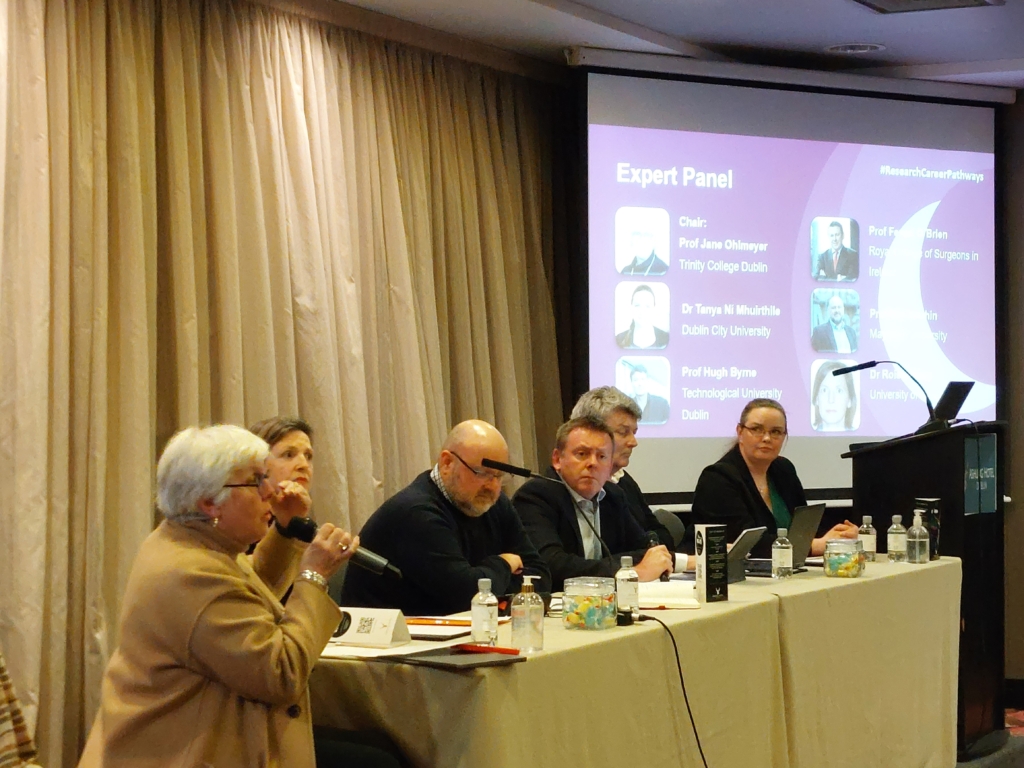The Irish Research Council (IRC) and the Irish Marie Skłodowska-Curie Office (IMSCO) joined forces bringing together 100 early career scholars and expert academics, facilitating the sharing of life journeys and professional tips. The speakers conveyed the message that grant-seeking strategies must be understood at all stages and are crucial to building successful research careers.
On Monday 24 April 2023, the IRC and the IMSCO co-hosted a research career pathways event for IRC awardees at the Ashling Hotel in Dublin: ‘National Grants, MSCA & ERC as pathways to an independent research career’. The Irish Marie Skłodowska-Curie Office is funded by the Irish Research Council in a strategic partnership with the Irish Universities Association, and provides support for applicants to the Marie Skłodowska-Curie Actions (MSCA) and the European Research Council (ERC) calls.
The aim of this event was to inform early-career IRC award holders, from postgraduate through to postdoctoral researchers, of the funding opportunities available through the MSCA and ERC calls, with particular focus on the MSCA Postdoctoral Fellowships and the ERC Starting Grant. It also highlighted the opportunities for national funding which can support such a pathway, from postdoctoral programmes to principal investigator-led awards.
A host of distinguished speakers gave presentations, sharing their experiences as past or current MSCA and/or ERC award-holders, on application strategies and their personal research journeys. The presentations included practical tools and general advice to an audience of 100 attendees. Members of the IMSCO and the IRC outlined current and future funding opportunities available to attendees.
Dr Louise Callinan, Director of the IRC, delivered an opening address, welcoming early career researchers to the co-hosted event and introducing attendees to key elements of the national and European research systems.
Dr Barry Molloy of the UCD School of Archaeology provided key strategic insights based on his experience in the national and European funding landscape, highlighting the trajectory between national early career awards and major national and European PI-led grant success.
Dr Yvonne Halpin, Head of the IMSCO, introduced MSCA grants, focusing on the Postdoctoral Fellowships scheme and postdoctoral opportunities through existing MSCA COFUND training programmes. She explained the importance of mobility and the cornerstone evaluation criteria of excellence, impact and implementation.
Dr Eoghan Cunnane of the Bernal Institute of the University of Limerick presented on his experience transitioning from postdoctoral fellowships to major EU PI-led grants. Sharing personal insights from his own journey, he emphasised the importance of considering the ERC remit, which is focused on grand challenges, and the main strengths of the applicant’s skills and track record.
Dr Chiara Loda, ERC (SSH) and Cluster 2 National Contact Point based at the IMSCO, introduced the European Research Council Starting Grant, providing insights into the transition from postdoctoral awards to PI-led application procedures, with particular emphasis on award budgets, evaluation process, application specifics and available support for applicants.
Dr Dawn Walsh of the UCD School of Politics and International Relations spoke about her own career trajectory, comprising back-to-back named grants, from PhD, through to IRC Starting Laureate and her future funding plans. She spoke on the importance of consistency in applications and continuing to seek grant support.
Dr Gráinne Walshe, Assistant Director of the IRC, presented on the scope for different pathways to advance research career success via national awards. She focused on the importance of smaller, network-focused awards in research trajectories.
For the final session of the afternoon, a panel of experts was convened to offer general advice on research career trajectories based on their experiences. Panel members included: Dr Tanya Ní Mhuirthile (Dublin City University); Prof. Fergal O’Brien (Royal College of Surgeons in Ireland); Prof. Rob Kitchin (Maynooth University); Dr Róisín Healy (University of Galway); and Prof Hugh Byrne (Technological University Dublin). Prof. Jane Ohlmeyer of Trinity College Dublin chaired the panel. The panel discussed barriers to funding applications and how to overcome them, and gave lots of practical advice, such as the benefits of thinking very broadly on developing one’s leadership profile through panel memberships, committee work and outreach work.
For more information on the funding schemes addressed at the event, please contact Chiara Loda (mariecurie@iua.ie).
